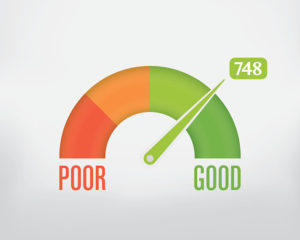Did you miss the last Lunch & Learn? On Jan. 23, Brock Collins, the Senior Membership Development officer at First Entertainment, came to the Guild to help members understand their credit score better—what affects it and how you can improve your score.
For those who couldn’t attend, here are a few highlights from his talk.

Credit Score Gauge
What’s your FICO score and how is it determined?
Lenders use FICO scores to determine if you qualify for credit or loans, i.e. a credit card, car loan, or home loan. The number is calculated based on various determining factors.
35% – Payment history – On-time payments raise your score, missed payments lower it. Missed payments (more than 30 days) can stay on your credit report for five years, up to seven.
30% – Amounts owed – Keep credit utilization under 30 percent. What does that mean exactly? Don’t have more debt than 30 percent of the credit available to you on your credit cards. For example, if you have $10,000 available, don’t have more than $3,000 in revolving credit card debt. If you do, your credit score will be affected negatively.
15% – Length of credit history – The longer you are associated with a credit card, the better. If you feel like you have too many cards and would like to close an account, make sure you do not close the card with the longest history.
10% – New credit – Did you recently sign up for a Home Depot card to get a 10% discount? If you apply for too many cards in a short period of time it can affect your score negatively.
10% – Types of credit – Showing that you can manage different kinds of credit—a credit card, car loan, home mortgage—works in your favor and can raise your score.
What else can affect your score?
• Improperly cancelled gym membership
• Unpaid traffic tickets
• Unpaid library fines
• New cell phones every year (if you finance them)
• Missed utility payments
What’s the difference between hard hits and soft hits on your credit report?
When a dealership checks to see if you qualify for a car loan they do what is called a hard hit. Hard hits can affect your credit score. Other hard hits include running your credit report more than once a year, mortgage loan or refinance applications, financing a cell phone or applying for credit cards. Soft hits are credit checks that do not affect your credit score. For example, a credit monitoring service or the FICO score you sometimes receive through credit cards are soft hits.
How can you improve your credit score?
• Log on to annualcreditreport.com and receive your free credit report. You are legally entitled to it once a year.
• Report any inaccuracies to the credit bureaus.
• Make sure your credit utilization (the amount of debt compared to your available credit) stays below 30%.
I want to buy a house. What should I do before applying for a loan?
- Check your credit report three to six months before applying for a loan. It will give you a chance to fix any mistakes on your report. Credit disputes take on average 60 days to fix.
- Some banks, like First Entertainment, will allow you to meet with a loan underwriter before applying. They can review your credit and situation and offer insight on how to prepare ahead of time.
What if I come from another country? How can I establish credit?
• Apply for a credit card. If you can’t get one because of a lack of credit history, apply for a secured credit card. Banks treat it as a credit card, but requires a deposit. After nine months of on-time payments, they will return the deposit and graduate you to a full credit card.
• Purchase a phone through an installment plan. Payments are reported to the credit bureaus and can help establish your credit.
• Apply for a car loan at a credit union. Most credit unions use manual underwriters, which means they will evaluate your circumstances individually. They will take into account how long you have worked and how much you get paid, not just your score.
The next Lunch & Learn offering an overview of benefits will be held on Feb. 20th from noon to 2 p.m. RSVP at rsvp@tag839.org.


